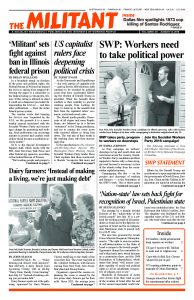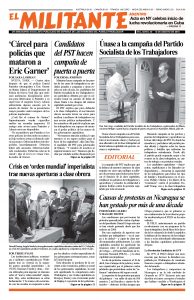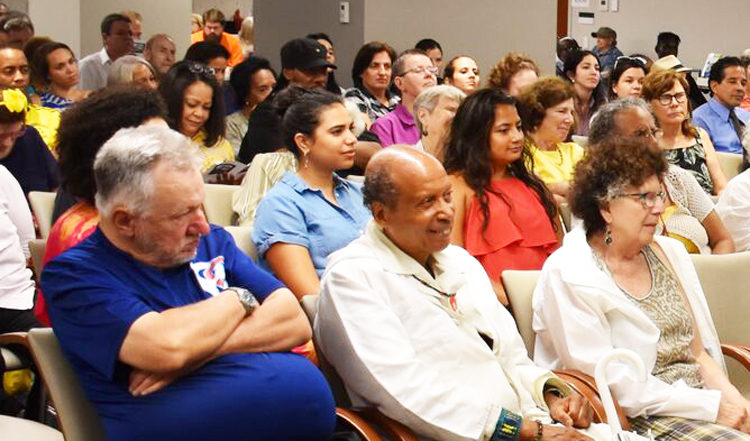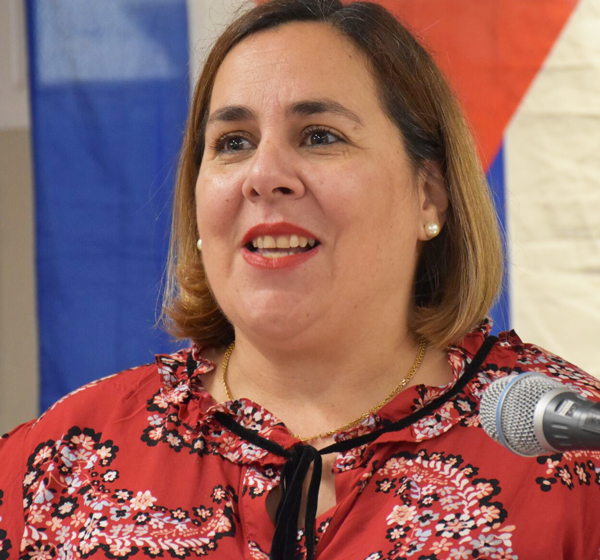NEW YORK — Over 170 people gathered at the New York State Nurses Association hall here July 27 to celebrate the 65th anniversary of the assault on the Moncada Barracks, the opening of Cuba’s revolutionary war.
“This action marked a historic, revolutionary milestone carried out by young people,” Ana Silvia Rodríguez, deputy ambassador from Cuba to the United Nations, told the crowd, “whose main objective was to transform Cuba’s political, economic and social regime and to eliminate foreign interference, misery, unemployment, and lack of health and education inflicted on our people.” The gathering was one of the largest at a Cuba solidarity event here in recent years.
On July 26, 1953, some 160 revolutionaries under the command of Fidel Castro launched an insurrectionary attack on the Moncada army garrison in Santiago de Cuba, and on the garrison in Bayamo, opening the revolutionary armed struggle against the U.S.-backed Fulgencio Batista dictatorship.
The event featured solidarity messages from Venezuela and from U.S.-based activists hailing from Haiti, Puerto Rico, Colombia and the U.S. Each speaker expressed solidarity with Cuba and the Cuban Revolution for its internationalism and for setting an example of what is possible for working people.
Berthony Dupont, editor of Haiti Liberté, said, “The victory in 1959 inspired revolutionary struggle throughout Latin America and the world.”
Judy Sheridan-Gonzalez, president of the nurses association, welcomed everyone to their headquarters. The union sponsors trips to Cuba to learn about “Cuban health care, to raise consciousness, and then bring it back,” she said. Estela Vázquez, executive vice president of the 1199SEIU union, and Gail Walker of Pastors for Peace also gave greetings.
Cuba conference
Interspersed in the program were firsthand reports from participants in recent activities in Cuba. Róger Calero described a panel at a conference in April sponsored by the Cuban Institute of History and the Central Organization of Cuban Workers (CTC), where he, Mary-Alice Waters of the Socialist Workers Party, and other socialist workers and a farmer spoke about their experiences in U.S. working-class struggles.
Waters highlighted the teachers’ strikes in West Virginia, Kentucky, Arizona and other states — some of them in the most economically devastated regions in the country that Trump carried by a large margin in the 2016 election. Among these working people, there is greater openness today than at any time in our political lives to think about and discuss what a socialist revolution could achieve.
José Luis López, a representative of the FMLN of El Salvador, gave a report on the just-concluded Sao Paulo Forum meeting in Havana.
Along with a good spread of food, there were hip-hop performances, live jazz and dance music. Harry D’Agostino and Dean Mahoney, two of the jazz trio, went to Cuba as members of the 2018 International May Day Brigade.
“We will continue to defend peace, justice and solidarity,” Deputy Ambassador Rodríguez said, “and we will do that with the same determination and firmness as the young people led by Fidel defended their convictions and ideals on July 26, 1953.”



